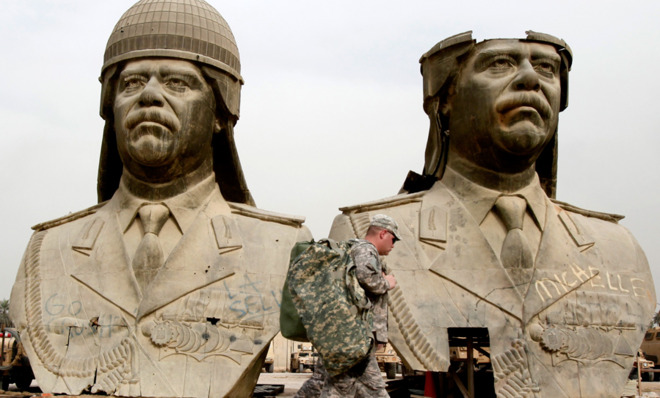Blackwater and the drunken colonialism of the Iraq War
A new report about the thuggish behavior of the private security contractor puts the conflict in a different light


A free daily email with the biggest news stories of the day – and the best features from TheWeek.com
You are now subscribed
Your newsletter sign-up was successful
Traditional colonialism has been basically dead for several decades, but its trappings are still with us. Just look at the Iraq War — while the U.S. occupation wasn't concerned with setting up rubber plantations and the like, it did look to the age of imperialism when it came to pacifying a subject population.
Instead of extracting resources from a prostrate Iraq, we spent trillions on a prolonged and ultimately ineffective counterinsurgency campaign. Let's call it "drunken colonialism," in which one nation invades, dominates, and trashes another for no benefit to itself or anyone else.
You can't find a better example of this phenomenon than this stunning scoop from James Risen at The New York Times. The story is about Blackwater, the infamous security contractor (which has since been merged with another company):
The Week
Escape your echo chamber. Get the facts behind the news, plus analysis from multiple perspectives.

Sign up for The Week's Free Newsletters
From our morning news briefing to a weekly Good News Newsletter, get the best of The Week delivered directly to your inbox.
From our morning news briefing to a weekly Good News Newsletter, get the best of The Week delivered directly to your inbox.
Just weeks before Blackwater guards fatally shot 17 civilians at Baghdad's Nisour Square in 2007, the State Department began investigating the security contractor's operations in Iraq. But the inquiry was abandoned after Blackwater's top manager there issued a threat: "that he could kill" the government's chief investigator and "no one could or would do anything about it as we were in Iraq," according to department reports. [The New York Times]
Back then, Blackwater was providing most of the security for high-level U.S. officials in Iraq. State Department investigators quickly compiled a long list of egregious malfeasance on Blackwater's part, including short-staffing guard detail, irresponsible weapons practices, and skimping on vehicle maintenance. When the main investigator, Jean C. Richter, met with Daniel Carroll, a former member of SEAL Team Six who was then Blackwater's top manager in Iraq, Carroll threatened to murder him over the investigation.
It turns out that Blackwater, closely associated with the highest levels of the U.S. occupation, was composed of a pack of mercenary thugs who would have fit in nicely in mid-’90s Yugoslavia. But the State Department sided with the thugs, and kicked Richter out of the country, saying he has disrupted the government's relationship with the company. It was only after the Nisour massacre that Blackwater became radioactive, forcing the government to rescind the company's free pass to threaten murder.
These swaggering, heavily armed goons were disturbingly reminiscent of colonial police forces. Then there was the the interim government they protected, the Coalition Provisional Authority, a colonialist entity if there ever was one. The CPA only lasted for about a year, but during that time L. Paul Bremer passed a raft of right-wing "reforms" that would transform Iraq in a way that was most beneficial to the U.S. economy.
Then there was the 10-year counterinsurgency campaign involving 100,000 occupying troops, which could be easily mistaken for France's war to maintain control over its colony Algiers, replete with the systematic use of torture. And when the occupation went very, very wrong, we resorted to stoking sectarian militias (including the arming and funding of death squads), a piece of divide-and-rule strategy straight out of the colonial handbook.
A free daily email with the biggest news stories of the day – and the best features from TheWeek.com
Of course, the war in Iraq wasn't intended as a colonialist project. But the lesson here is that any effort to rule another nation by force, no matter how noble those intentions might be, will increasingly develop a colonialist character. And like many a colonialist effort, the invasion of Iraq was doomed from the start.
Ryan Cooper is a national correspondent at TheWeek.com. His work has appeared in the Washington Monthly, The New Republic, and the Washington Post.
-
 At least 8 dead in California’s deadliest avalanche
At least 8 dead in California’s deadliest avalancheSpeed Read The avalanche near Lake Tahoe was the deadliest in modern California history and the worst in the US since 1981
-
 Political cartoons for February 19
Political cartoons for February 19Cartoons Thursday’s political cartoons include a suspicious package, a piece of the cake, and more
-
 The Gallivant: style and charm steps from Camber Sands
The Gallivant: style and charm steps from Camber SandsThe Week Recommends Nestled behind the dunes, this luxury hotel is a great place to hunker down and get cosy
